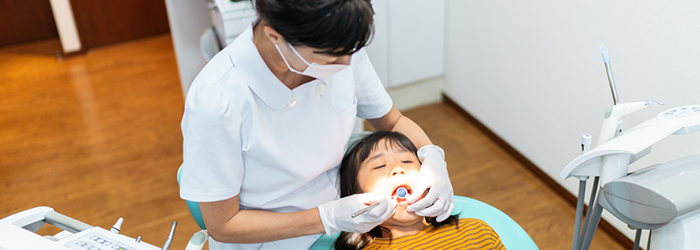Creating and maintaining good habits is an important skill for everyone, no matter their age. For young children, however, the formation of these good habits can impact the rest of their lives. Parents who encourage their children to have good oral health habits such as brushing, flossing, and regularly seeing a dentist from a young age helps ensure they have healthier futures.
Early Oral Health Habits for Infants
Establishing oral health habits starts before birth. Women who are pregnant should see a dentist regularly to reduce the risk of oral infections, which can be a cause of early birth. Babies born prematurely, before they are full-term, are more likely to have serious medical complications such as cerebral palsy, vision problems, dental problems, and chronic health issues. Additionally, mothers with poor oral health can pass bacteria from their mouths to their babies, which can lead to significant oral health problems for the child in the future.
Oral health care for your child can start as soon as a baby is born. Medical and dental professionals encourage parents to clean the gums of children who do not have teeth twice a day. This can be done with a clean, damp cloth or piece of gauze that is wiped gently over the gums. Not only does this clean their mouth, but it also helps establish an early oral health habit of brushing twice a day.
Oral Health Habits in Toddlers and Young Children
The American Academy of Pediatric Dentistry states “as soon as the teeth begin to appear, start brushing twice daily using fluoridated toothpaste and a soft, age-appropriate sized toothbrush.” However, a study found that 80 percent of children in the United States start brushing their teeth later than is recommended. This is a significant finding that may have serious impacts on the oral health of toddlers and young children.
Toddlers who do not practice good oral hygiene routines are more likely to develop plaque and tartar build-up on their teeth. This can lead to cavities at a very young age. Cavities in children can have a variety of negative side effects including delayed speech and low self-esteem. Additionally, incorrect or insufficient tooth brushing may lead to excess bacteria in the body. This bacteria overgrowth may lead to inflammation in the body and oral diseases such as thrush.
One of the best ways to encourage good oral health habits in toddlers and young children is to see a dentist early in life. Most dental professionals recommend that all children see a dentist by the age of one and sometimes as soon as the first tooth erupts.
Going to the dentist early creates life-long oral health habits
Of all the good habits parents should instill in their children, going to a dentist early and regularly is one of the most important.
Seeing a dentist by the age of one helps children become familiar with the process and what to expect. This will help them feel more at ease and comfortable when they go to the dentist. It’s a good idea to find a dental professional who has experience working with kids, such as a pediatric dentist, to make sure your child's first appointment goes smoothly.
With 50% to 80% of adults in the United States experiencing dental anxiety or fear, the time to make the dentist's office a comfortable space is during childhood. People who suffer from dental anxiety are more likely to avoid dental checkups and have a higher risk of dental problems. Therefore, acknowledging and mitigating dental anxiety in children is one of the best ways for parents to ensure good oral and overall health in the future.
We understand that parents have so much to do when raising a family and worrying about the health of your child’s smile doesn’t need to create more stress. Adding routine dental care, both at home and at the dentist, will be worth it. Your child and his/her smile will thank you for a lifetime!


